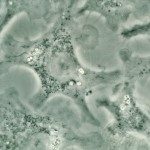Link to Pubmed [PMID] – 17973657
Cell. Microbiol. 2008 Jan;10(1):134-48
Invasive aspergillosis is a life-threatening disease mainly caused by the fungus Aspergillus fumigatus. In immunocompromised individuals conidia are not efficiently inactivated, which can end in invasive fungal growth. However, the metabolic requirements of the fungus are hardly known. Earlier investigations revealed an accumulation of toxic propionyl-CoA in a methylcitrate synthase mutant, when grown on propionyl-CoA-generating carbon sources. During invasive growth propionyl-CoA could derive from proteins, which are released from infected host tissues. We therefore assumed that a methylcitrate synthase mutant might display an attenuated virulence. Here we show that the addition of propionate to cell culture medium enhanced the ability of alveolar macrophages to kill methylcitrate synthase mutant but not wild-type conidia. When tested in a murine infection model, the methylcitrate synthase mutant displayed attenuated virulence and, furthermore, was cleared from tissues when mice survived the first phase of acute infection. The amplification of cDNA from infected mouse lungs confirmed the transcription of the methylcitrate synthase gene during invasion, which leads to the suggestion that amino acids indeed serve as growth-supporting nutrients during invasive growth of A. fumigatus. Thus, blocking of methylcitrate synthase activity abrogates fungal growth and provides a suitable target for new antifungals.
